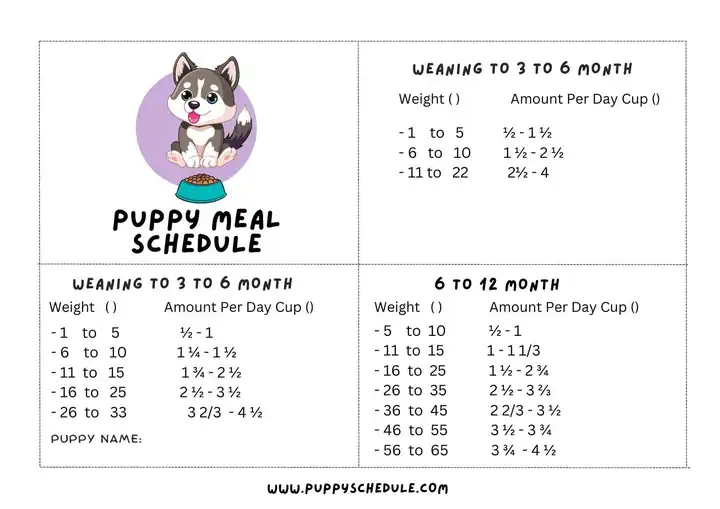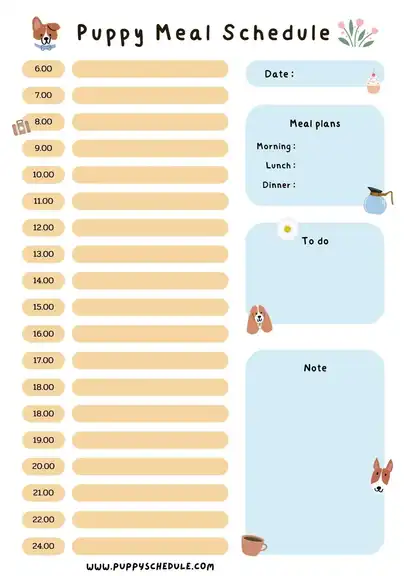As a responsible pet owner, ensuring your puppy receives the proper nutrition to promote healthy growth and development are important. To do this, you must consider various factors when planning a puppy’s feeding schedule. Here are the 10 things to consider for the best puppy meal schedule.
Introduction Puppy Meal Schedule
Before we dive into the details, it’s essential to comprehend why a balanced diet is important for your puppy. Feeding your puppy a balanced diet can promote healthy growth and development, keep a healthy weight, and prevent health problems later in life. Planning a puppy meal schedule that considers your puppy’s nutritional needs can assist in guaranteeing healthy and happy energy for your furry friend.

How Often Should You Feed Your Puppy?
Feeding your puppy the right portion and frequency of meals is vital for their healthy growth and development. The puppy meal schedule commonness should be founded on the puppy’s age and size to ensure they receive the right nutrition.
Recommended feeding frequency based on the puppy’s age and size
- Puppies under 3 months old: 4 meals per day
- Puppies between 3 and 6 months old: 3 meals per day
- Puppies over 6 months old: 2 meals per day
These guidelines are just a general rule of thumb, as the feeding frequency should also depend on your puppy’s size, breed, and individual needs. For example, smaller breed puppies may require more frequent meals, while larger breed puppies may need less frequent meals. Ask your veterinarian for clarification on your puppy’s appropriate feeding frequency.
Tips for creating a best puppy meal schedule
Creating a puppy meal schedule is crucial for guaranteeing that your puppy receives the proper nutrition and is on track for healthy growth and development. Here are some suggestions for making it:
- Choose a consistent time of day to feed your puppy. This will allow them to develop a routine and make it more comfortable for you to remember to feed them.
- Divide your puppy’s daily food intake into the appropriate meals based on age and size.
- Measure the appropriate quantity per meal using a food scale or measuring mug.
- Set a timer to remind it.
- Avoid feeding your puppy too close to bedtime, as this can cause digestive problems.
pros and cons of free-feeding
Free feeding leaves food for your puppy to eat whenever they feel hungry. While this may seem convenient, free feeding has pros and cons.
Pros:
- Your puppy can eat whenever they feel hungry, which can help prevent hunger-related behavior problems.
- There is no strict puppy meal schedule, which can be more convenient for some pet owners.
- Free feeding can work well for active puppies and burn off calories quickly.
Cons:
- It can be hard to monitor how much your puppy eats, directing to overfeeding and obesity.
- Leaving food out for long periods can attract insects and other pests.
- Some puppies may become finicky and refuse to eat their food if it is left out for too long.
In general, free feeding is not suggested for puppies. Instead, a structured puppy meal schedule that considers your puppy’s needs is the best approach to ensure they receive the proper nutrition.
What to Include in Your Puppy’s Diet
A well-rounded, nutritious diet is essential to support your furry friend’s overall health and development. Here is a rundown of the different kinds that can include in your puppy’s diet, along with their advantages and disadvantages.
Types of Food
Dry Kibble: It is a popular and practical option for many pet owners, as it’s convenient to store and affordable. It can also help enhance your puppy’s dental health by scraping off plaque. However, some dry kibble may contain fillers and preservatives, and it can be challenging to assess the quality of the ingredients.
Wet Food: It is an excellent choice for puppies that have situations chewing or digesting dry kibble. Additionally, it can assist in keeping your pup hydrated. However, wet food is generally more expensive than dry kibble and may spoil if not refrigerated correctly.
Raw Food: Some pet owners opt for a raw food diet consisting of uncooked meat, vegetables, and fruits. The advantages of this diet have fresh and minimally processed ingredients, improved digestion, and coat health. However, a natural diet can be expensive and may only provide some of the required nutrients for your puppy.
Homemade Food: Preparing homemade meals for your pup can offer you rule over the components, ensuring a balanced diet. However, it may be time-consuming and expensive to prepare, and it can take a lot of work to confirm that your puppy gets all the required nutrients.
Remember, it’s essential to consult with your veterinarian to pick the best food alternatives and amount sizes to keep your pup’s specific needs.
Importance of Nutrients on the puppy meal schedule
It is vital to view the nutrients your puppy needs in their diet.
Here are the key nutrients that should be contained in your puppy’s diet:
- Protein: essential for building and fixing the problem and holding a healthy coat and skin.
- Carbohydrates: provide energy and aid in digestion.
- Fats: provide energy and allow your puppy to absorb essential vitamins.
- Vitamins: are important for various bodily functions, including maintaining healthy bones, eyesight, and a strong immune system.
- Minerals: such as calcium and phosphorus, are vital for healthy bone development.
Confirming that your puppy accepts the appropriate balance of these nutrients in their diet is crucial. Please consult your veterinarian to pick the proper portion sizes and kinds of feeds for their needs.
How Much Should You Feed Your Puppy?

To guarantee that your puppy accepts the proper nutrition without overfeeding or underfeeding, selecting the proper portion size based on age, size, and activity level is necessary.
Determining Portion Size
When feeding your puppy, it’s crucial to determine the right portion size to ensure they receive the necessary nutrition without overeating or under-eating. The proper portion size depends on age, weight, and activity level. To pick the proper portion sizes, it’s best to consult with your veterinarian. Measuring the food carefully and adjusting the portion size as required is also crucial.
Risks of Overfeeding and Underfeeding
Both feeding habits can pose significant threats to your pup’s health and well-being. Overfeeding can induce obesity, leading to joint problems, diabetes, and different health problems that can severely affect your pup’s quality of life. Similarly, underfeeding can lead to malnutrition, stunted growth, and other health complications that can hinder your pup’s development. Hence, it’s crucial to maintain an appropriate feeding regimen to ensure your puppy stays healthy and happy.
Preventing Accidental Ingestion
Another crucial point to keep in mind is the prevention of accidental ingestion of contaminated foods. It’s imperative to keep toxic foods out of your pup’s reach and dispose of any food waste properly. If you imagine your furry friend has ingested toxic food, you must contact your veterinarian immediately. These preventive measures can safeguard your pup’s health and prevent unwanted health complications.
What Foods Should You Avoid Feeding Your Puppy?
Ensuring a healthy diet is crucial for your puppy’s growth and development. However, it’s equally vital to be mindful of the foods you should avoid feeding your furry friend. Here are some foods that can be dangerous:
Chocolate: The theobromine in chocolate can harm dogs
Grapes and Raisins: The consumption of grapes and raisins can induce kidney loss in puppies.
Onions and Garlic: These foods have combinations that can harm your puppy’s red blood cells, leading to anemia.
Avocado: The presence of persin in avocado can induce vomiting and trots in puppies.
Alcohol: It can harm dogs, inducing trots and potentially death.
Coffee and Caffeine: It has theobromine, which can harm puppies.
Bones: They can splinter and induce digestive problems or even stick to your puppy’s digestive tract.
What to Do If Your Puppy is a Picky Eater
It’s essential to select the reason and take action to enable them to consume. This may include adjusting the kind of meals you are feeding them, offering smaller, more frequent meals, or consulting with a veterinarian.
It can be frustrating and concerning if your puppy is a picky eater. Here is some advice for boosting your puppy to eat their food:
- Determine the Reason for Picky Eating: Some puppies may be picky eaters due to medical conditions, anxiety, or stress. If you imagine that there may be an underlying issue, consult with your veterinarian.
- Stick to a puppy meal schedule: Offer your puppy food at the same time every day to establish a routine.
- Avoid Feeding Your Puppy Table Scraps: Feeding your puppy table scraps can encourage picky eating and lead to nutritional imbalances.
- Try a Different Type of Food: Your puppy may not like their current food. Try switching to a different brand or type of food to see if your puppy prefers it.
- Add Some Flavor: Add a small amount of chicken broth or low-sodium beef broth to your puppy’s food to make it tastier.
- Use Treats to Encourage Eating: Use a small number of low-calorie treats to encourage your puppy to eat its food.
When to Seek Professional Help
If your puppy is consistently refusing to eat or is losing weight, it is important to seek professional help. Your veterinarian can perform a physical examination and run tests to determine if there is an underlying medical issue. Additionally, a veterinary nutritionist can guide the puppy meal schedule of a picky eater and ensure that your puppy gets the proper nutrients.
Picky eating can be a common issue for puppies. If your puppy is a picky eater, try these tips to encourage them to eat. If your puppy consistently refuses to eat, it is important to seek professional help. By working with your veterinarian and a veterinary nutritionist, you can help ensure that your puppy gets the proper nutrition for their growth and development.
Conclusion
These 10 things to consider best puppy meal schedule can help ensure that your furry friend receives the proper nutrition for healthy growth and development. Remember to consider your puppy’s needs, adjust their feeding schedule as needed, and choose high-quality food appropriate for their age and size. Doing so can help promote your furry companion’s long, healthy life.
We hope you find this article informative and helpful in planning your puppy’s meal schedule. Remember, a little planning and attention to detail can go a long way in ensuring your furry friend’s health and happiness.


